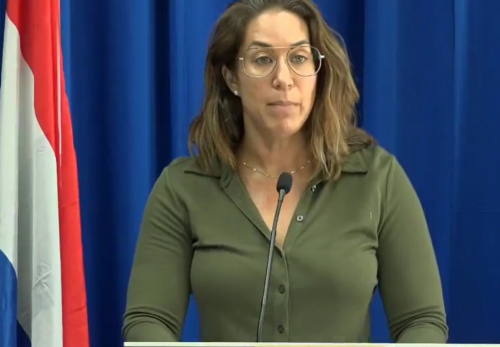 PHILIPSBURG: --- Minister of Justice Nathalie Tackling has confirmed that the long-awaited new prison facility for Sint Maarten will soon enter its construction phase under the management of the United Nations Office for Project Services (UNOPS).
PHILIPSBURG: --- Minister of Justice Nathalie Tackling has confirmed that the long-awaited new prison facility for Sint Maarten will soon enter its construction phase under the management of the United Nations Office for Project Services (UNOPS).
Speaking during Wednesday’s Council of Ministers press briefing, Minister Tackling said the project represents “months of planning, collaboration, commitment, and meaningful reform” in Sint Maarten’s detention system.
“UNOPS is gearing up to start the construction of the new prison facility officially,” Tackling announced. “More information will be shared in the coming days, but I can assure the people of St. Maarten that progress is being made.”
The new facility will be constructed in two phases.
- Phase One, scheduled for completion in Q1 2027, will increase capacity from 80 to 120 cells.
- Phase Two, expected by 2028, will bring the total to 196 cells.
“This number was chosen carefully,” Tackling explained. “Old reports suggested we would need around 300 cells, but that’s not a number we can afford as a country. We balanced what’s realistic, what’s sustainable, and what aligns with our national budget.”
Currently, the Pointe Blanche Prison has 80 male cells, six female cells, and 15 police holding cells (limited by law to ten days of detention).
Addressing Systemic Backlogs
The Minister also addressed widespread confusion about Sint Maarten’s prison backlog.
“It’s not 300 people waiting to serve sentences — it’s roughly 300 to 400 years’ worth of sentences accumulated over time,” she clarified, citing figures from the Prosecutor’s Office.
Tackling said the capacity issue has been persistent since Hurricane Irma (2017) and compounded by human rights rulings that forced the government to reduce overcrowding.
“This isn’t new,” she said. “It’s been pervasive for at least a decade. But now we are finally seeing structural reform.”
Human Development Behind Bars
In partnership with the United Nations Office on Drugs and Crime (UNODC), Tackling’s ministry is rolling out programs focused on rehabilitation, vocational training, and reintegration.
“We need to give something to the individuals who are currently incarcerated,” she said. “We cannot just say, ‘We’re building a new facility.’ We must provide programs and activities before the new prison opens.”
She also confirmed funding for a baseline study to identify inmates’ psychological and social care needs and is exploring partnerships with local NGOs to resume mental health and therapy services disrupted by outstanding payments.
“I know how long this has taken,” Tackling admitted. “But it’s all really coming together beautifully, and I’m proud of the work we’re doing.”












